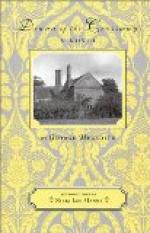ways of dressing and thinking. Whence it came
that she had some of her wildest seizures of iridescent
humour. Danvers attributed the fun to her mistress’s
gladness in not having pursued her bent to quit the
country. Redworth saw deeper, and was nevertheless
amazed by the airy hawk-poise and pounce-down of her
wit, as she ranged high and low, now capriciously generalizing,
now dropping bolt upon things of passage—the
postillion jogging from rum to gin, the rustics baconly
agape, the horse-kneed ostlers. She touched
them to the life in similes and phrases; and next she
was aloft, derisively philosophizing, but with a comic
afflatus that dispersed the sharpness of her irony
in mocking laughter. The afternoon refreshments
at the inn of the county market-town, and the English
idea of public hospitality, as to manner and the substance
provided for wayfarers, were among the themes she
made memorable to him. She spoke of everything
tolerantly, just naming it in a simple sentence, that
fell with a ring and chimed: their host’s
ready acquiescence in receiving, orders, his contemptuous
disclaimer of stuff he did not keep, his flat indifference
to the sheep he sheared, and the phantom half-crown
flickering in one eye of the anticipatory waiter;
the pervading and confounding smell of stale beer
over all the apartments; the prevalent, notion of bread,
butter, tea, milk, sugar, as matter for the exercise
of a native inventive genius—these were
reviewed in quips of metaphor.
‘Come, we can do better at an inn or two known
to me,’ said Redworth.
’Surely this is the best that can be done for
us, when we strike them with the magic wand of a postillion?’
said she.
‘It depends, as elsewhere, on the individuals
entertaining us.’
’Yet you admit that your railways are rapidly
“polishing off” the individual.’
‘They will spread the metropolitan idea of comfort.’
’I fear they will feed us on nothing but that
big word. It booms— a curfew bell—for
every poor little light that we would read by.’
Seeing their beacon-nosed postillion preparing too
mount and failing in his jump, Redworth was apprehensive,
and questioned the fellow concerning potation.
’Lord, sir, they call me half a horse, but I
can’t ‘bids water,’ was the reply,
with the assurance that he had not ‘taken a pailful.’
Habit enabled him to gain his seat.
’It seems to us unnecessary to heap on coal
when the chimney is afire; but he may know the proper
course,’ Diana said, convulsing Danvers; and
there was discernibly to Redworth, under the influence
of her phrases, a likeness of the flaming ‘half-horse,’
with the animals all smoking in the frost, to a railway
engine. ‘Your wrinkled centaur,’
she named the man. Of course he had to play second
to her, and not unwillingly; but he reflected passingly
on the instinctive push of her rich and sparkling
voluble fancy to the initiative, which women do not




